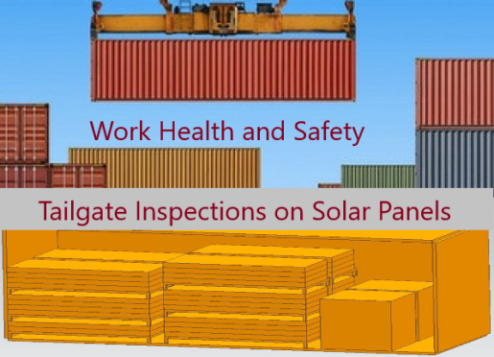The Department of Agriculture Fisheries and Forestry (DAFF) has previously identified that consignments of solar panels can pose a WHS (Workplace Health & Safety) risk to staff during rural tailgate inspections when the container doors are opened. All FCLs of solar panels that require a rural tailgate inspection are instead directed for an external container inspection.
DAFF has this week issued Industry Advice Notice 224-2023: Changes to lodgement of documentation for imported Solar Panels through the class 19.1 Non Commodity for Containerised Cargo Clearance (NCCC) approved arrangement.
It is targeted to Customs brokers, importers, self-reporting importers, freight forwarders, and accredited persons operating under the class 19.1 non commodity for containerised cargo clearance approved arrangement associated with the reporting of FCLs of solar panels (tariff codes 854142, 854143 and 854149) that would be subject to rural tailgate inspections.
A recent system update now allows accredited persons to utilise AEP (Automatic Entry Processing) for these consignments. Accredited persons are no longer required to volunteer consignments of solar panels destined for rural unpack to DAFF.
Automatic Entry Processing (AEP)
The class 19 approved arrangements are:
- Class 19.1 non-commodity for containerised cargo clearance (NCCC)
Allows an accredited person to assess documentation associated with containerised sea freight against the non-commodity import conditions. - Class 19.2 automatic entry processing for commodities (AEPCOMM)
Allows an accredited person to assess commodity import documentation associated with specific commodities in scope of the approved arrangement.
Accredited persons can now use AEP to direct rural destined solar panels through AEP the same as all other consignments subject to rural tailgates. Accredited persons will be issued with the relevant external container inspection direction, specific to the AA class (whether it be a class 1AA or class 14.4 AA).
What are the WHS risk issues?
According to information on the Queensland Government’s WorkSafe website, there have been a series of incidents where objects, including toppling slabs and panels, have injured workers opening container doors.
The force from the mass and potential movement of objects is commonly underestimated. Once an object (load) begins to suddenly move or fall towards someone close by, there is often limited opportunity to avoid being struck.
The risk of crushing or entrapment around shipping container work increases when:
- activity occurs within the ‘fall shadow’ of an object that is not restrained, or where there is potential for restraints to fail
- people attempt to physically restrain or stop a falling object
- objects move more than expected or in an unintended way during handling, which often causes the object to fall
- shipping containers are inappropriately packed
- damage occurs or loads shift during transport
- plant is used incorrectly (overloading forklifts and using lifting attachments not specifically designed for the task)
- mass, speed and force applied is underestimated when an object is moved by a crane or forklift.
Unpacking containers without a safe system of work can expose workers to risk, especially when they’re dealing with heavy, awkward and unsecured items.
Also see our related article on Smart Containers.
Colless Young professionally handles all your consignments by sea and air, both import and export. As licensed Customs Brokers and International Freight Forwarders, we provide a complete range of services including customs clearance, quarantine treatments, landed costings, trucking and warehousing. With out head office in Brisbane, Colless Young offer logistics facilities through all major Australian ports and airports.

